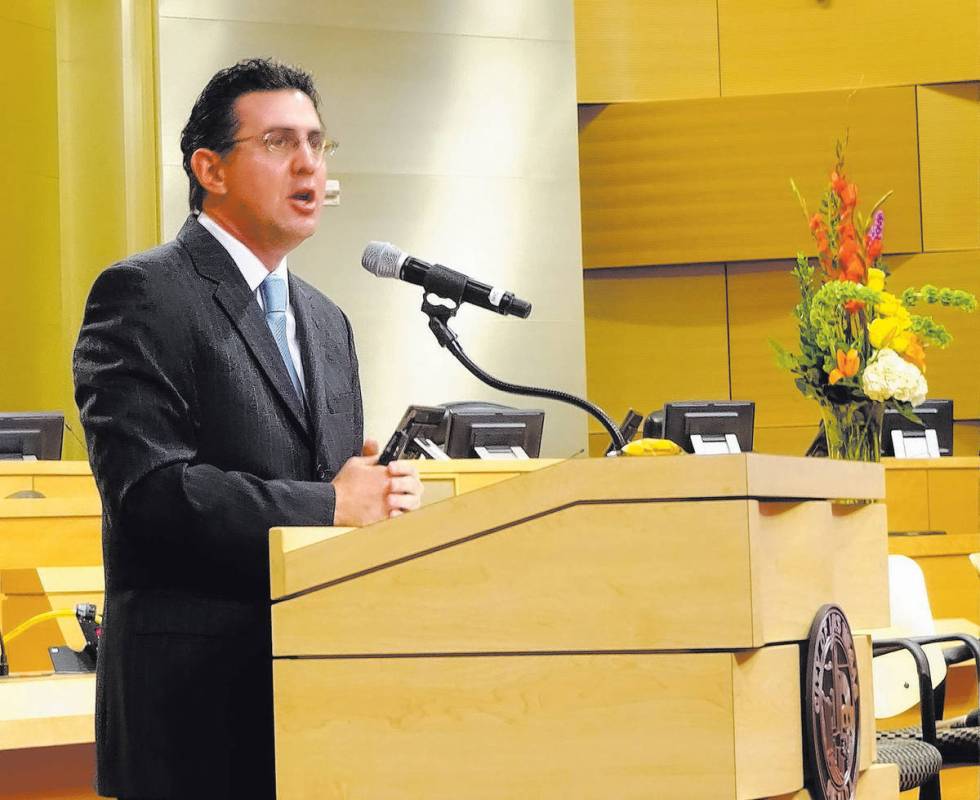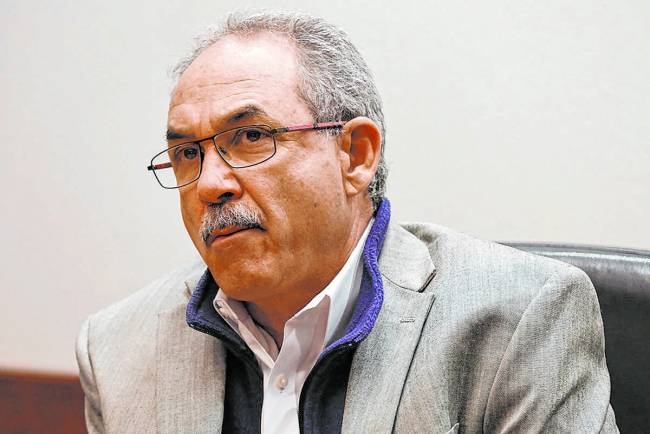What’s ahead for union contracts under virus crisis — concessions or battles?
About half of Southern Nevada’s public-sector union contracts are under negotiation or will expire at the end of June, giving labor groups an immediate opportunity to accept or fight concessions to help balance government budgets devastated by the COVID-19 crisis.
Local governments already have suspended more than 25 contracts and announced massive — once unimaginable — budget cuts. Unions covering more than 18,000 public workers fear the valley’s tourism industry shutdown will roll back hefty pay and benefit increases won in the decade after the Great Recession.

Jeffrey Waddoups
Adding to the problem, uncertainty about the extent of the financial damage from the crisis will make it difficult for unions and governments to negotiate collective bargaining agreements, possibly sending many to arbitration, experts say.
“That is going to make collective bargaining kind of dicey,” said C. Jeffrey Waddoups, chair of UNLV’s economics department.
A review of actions taken after the Great Recession and interviews with union leaders, government officials and economists show major hurdles for governments and collective bargaining in the coming months: Unions made pay and benefit concessions after the 2008 housing crash to reduce furloughs and layoffs, but some held out and fought to keep their perks. Today some unions already are willing to come to the table while others plan to fight any salary and benefit concessions.
Public employees, on average, make more in pay and benefits than private-sector employees, though union officials say the pay disparity isn’t significant when you account for experience, education and skill sets.
After the 2008 crash, local governments generally negotiated short-term contracts and stopped providing controversial, expensive perks like longevity pay. But some union workers still were seeing percentage pay increases in double digits over the term of their contracts.

Jeremy Aguero, an analyst with Las Vegas-based Applied Analysis, a firm that models economic trends for government agencies and private organizations, said a lot has changed in Nevada in response to the 2008 economic crisis.
“The actions taken by choice or necessity during the Great Recession provide a great framework of options available to the state and local governments,” he said. “But because governments have become more efficient, there will also be less room to give and cut than before.”
It’s not clear right now how much money state and local governments will lose because of the shutdown of casinos and the halt to the state’s tourism industry. Clark County Manager Yolanda King has forecast $1.1 billion in lost revenue over the next 12 to 18 months, which in the near term could mean 600 county jobs.
Clark County schools already had a $17 million budget deficit before the virus shut down the economy. Las Vegas officials are bracing for as much as a $100 million reduction to their $600 million budget. North Las Vegas and Henderson each expect about $60 million each in shortfall from the crisis.
And Gov. Steve Sisolak told state agencies in early April to expect nearly $700 million in cuts over the next two years. Since the majority of government general funds pay for employee salaries and benefits, union contracts will be a major focus of contention for months to come.
In Clark County, seven of 10 Service Employees International Union Local 1107 bargaining unit agreements expire at the end of June. Las Vegas officials are negotiating with firefighters and other public safety staff whose contracts ended in 2019. And contracts with North Las Vegas police and firefighters, the Regional Transportation Commission, the Las Vegas Valley Water District and many Henderson employees all end June 30.
After 2008, Clark County firefighters, who were some of the highest-paid government employees in the area, drew the anger of residents and elected officials for refusing to make concessions.
The Clark County Education Association seems to be taking a similar approach during this downturn.
Union Executive Director John Vellardita said April 16 that his members took a huge hit to their health insurance after the Great Recession, and they don’t plan to make concessions during this downturn.
“We don’t agree with the governor that all agencies need to take a 4 percent cut,” he said. “We don’t want to race to the lowest denominator. We should be discussing how to get out of this situation.”
To bolster school funding, the union in January proposed raising sales and casino taxes by more than $1 billion to fund education. The proposal is on hold because organizers can’t gather signatures during social distancing mandates, but Vellardita vowed to push the increases as soon as coronavirus restrictions are lifted.
School Superintendent Jesus Jara declined comment when reached by phone, directing questions to communications staff. Staff would not provide an interview and offered to respond only if the Review-Journal provided written questions.
Vellardita said he is not concerned that the district could eliminate teaching jobs to fill budget holes. “If they want layoffs, they can answer to parents,” he said. “These class sizes are the largest in the country.”
The national teachers union released a study in 2018 showing Nevada tops the country in student-to-teacher ratios.
SEIU 1107 Nevada president Brenda Marzan is taking a more conciliatory approach.

“I told my members to prepare for layoffs because they will probably happen,” said Marzan whose union represents more than 7,000 county workers, including county public works, court officers, airport employees and human services staff. “Our intent is to keep as many of our members employed and receiving a paycheck as possible.”
Robert Fellner, who studies union contracts for the free-market, limited-government advocate Nevada Policy Research Institute, said he expects unions to do everything possible to protect their salary and benefit gains.
“They’re going to fight tooth and nail and put their interests before the public interest,” said Fellner, the institute’s transparency director. “I have no expectation that they will do the right thing.”
Nevada was one of the states hardest hit by the real estate crash and resulting recession.
Cities like North Las Vegas discussed bankruptcy or a possible state takeover. Governments across the board implemented furloughs, layoffs, pay cuts and hiring and pay freezes. Officials slashed budgets by tens of millions of dollars. Many unions stepped up with pay and benefit concessions to mitigate layoffs. In 2010, Las Vegas forecast an $80 million shortfall, laying off more than 200 employees in single day.
Las Vegas Mayor Carolyn Goodman expects the all city’s unions to work with government officials in response to the global pandemic.
“We look at unions as part of our family. I don’t know about the last mayor,” Goodman said, ironically referring to her husband, Oscar, who headed the city from 1999 to 2011. “All of our unions will keep coming to the table and understand we’re all in this together.”
Clark County, Las Vegas, North Las Vegas, the Metropolitan Police Department and University Medical Center employees had their contracts suspended under emergency provisions in the pacts. Las Vegas implemented a hiring freeze and furloughs of some part-time workers.
Marzan said she doesn’t believe the county followed the law when suspending SEIU contracts, but the union decided against filing a grievance after county officials assured leaders that the suspension was temporary and that most provisions would remain untouched. The Teamsters union, representing North Las Vegas workers, has filed a grievance saying the city did not properly suspend the contract, according to Nevada Employee-Management Relations Board Commissioner Bruce Snyder.
He said the complaint probably won’t be resolved until July.
Since the 2008 crash, union contracts and state laws pertaining to unions have changed significantly.
In 2015, the Legislature passed a law allowing governments to reopen union contracts during fiscal emergencies. That law was repealed last year, but provisions still allow suspensions for civil unrest and natural disasters.
Aguero said one of the biggest ways Las Vegas, Henderson and North Las Vegas saved money after the Great Recession was going to a four-day workweek, but it’s difficult to see how that could happen again. “They’re not going to a three-day week,” he added.
Before 2008, many unions negotiated contracts that lasted five or more years, reducing the flexibility governments had if the economy took a downturn.
Since then, nearly all union contracts have lasted three or fewer years. And provisions like longevity pay and annual “cost of living” increases of 4 or 5 percent — with no relation to the Consumer Price Index — have largely disappeared.
But some unions continue to find ways to get their members compensation increases that are unheard of in the private sector.
In negotiations during the recession, some local governments agreed to pay workers’ share of state pension contributions to make up for pay cuts. Currently, Public Employees’ Retirement System contributions total 42.50 percent for fire and police employees and 29.25 percent of annual salary for all rank-and-file employees. Not only have defined-benefit pensions all but disappeared from the private sector, but employer matches to 401(k) plans don’t remotely approach those figures.
And double-digit pay hikes over a single contract still exist even for workers who aren’t necessarily doing the best job.
In the contract expiring at the end of June, Marzan’s members received a 2.25 percent cost of living raise in each of the three years. And if his or her work were rated “meets expectations” or better, the worker would get an additional 4 percent until he or she hit the top of the pay scale. The worker must be notified that he or she isn’t doing well in their job in time to improve the performance review.
A prior contract had increases based on how well the worker was rated on performance reviews.
It is estimated about 80 percent of SEIU’s members received increases of more than 20 percent over the three-year contracts that end June 30.
Clark County declined to discuss the contract or what will happen in coming months.
Commission Chairwoman Marilyn Kirkpatrick did not respond to calls seeking comment, and county spokesman Dan Kulin emailed to say she was “not available.”
UNLV’s Waddoups conceded that taxpayers who work for the private sector haven’t received the same raises and benefits as government workers. He said that shows the power of public sector unions.
“There had definitely been stagnation in wages for workers in general in the U.S.,” he said. “It’s hard to know what’s going on, and it’s controversial, but workers don’t have enough bargaining power.”

Vellardita, whose teachers received pay and benefits worth $140 million over the current two-year contract, said it’s clear that his members are still underpaid because the district has trouble filling as many as 750 positions each year.
One of the biggest — and likely costliest — victories for government worker unions came from the Democrat-controlled Legislature last session.
Lawmakers agreed to allow state employees to unionize, which had been banned. State officials complained that they regularly lost workers to local governments that paid better and fully funded pension contributions.
But unionizing the Nevada’s approximately 20,000 state workers could be a billion-dollar burden on the state budget.
The Vegas Chamber released a study last year that estimated the change will add as much as $1.7 billion a year to the state budget by 2034.
“It can provide higher wages and benefits to public employees and can influence the wages and benefits of private sector employees,” the authors said. “It can also balloon a state’s budget and create pressure to raise tax and/or cut spending in other government activities.”
In 2011, the chamber also released a study showing that Nevada public employees are some of the highest paid in the nation. Chamber staff declined comment for this story.
Since then, census records show that public employees, on average, make significantly more than workers in the private sector. In 2018, the last year data were available, the average private salary was $40,367 while the average government worker made $59,639 a year. And that did not even include the disparity in lucrative benefits like pensions that guarantee a large percentage of a government worker’s salary for life.
Fellner said the public workers’ unions have made government inefficient and unfair to the taxpayers.
“The reason it matters is because the taxes fall disproportionately on lower-income residents in the form of sales and property taxes,” he said. “There’s nothing generous about taking money from people who earn less to give it to people who earn more.”
Marzan concedes that lower-pay workers like custodians and truck drivers do better in government jobs, but supervisors and professionals could earn more in the private sector.
“I’m in IT and what I could make in the private sector is twice as much,” said Marzan, who has been with the county for 32 years.
Aguero said the reason Nevada, which has a relatively low cost of living, pays its public employees so well is because there are fewer of them than in other states.
“Our teachers are the 15th highest paid in the United States unless you look at per pupil pay, and then we’re dead last,” he said. “We’re asking more from those teachers.”
Contact Arthur Kane at akane@reviewjournal.com. Follow @ArthurMKane on Twitter. Kane is a member of the Review-Journal’s investigative team, focusing on reporting that holds leaders and agencies accountable and exposes wrongdoing.



















